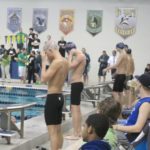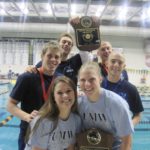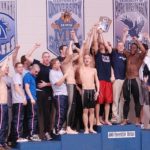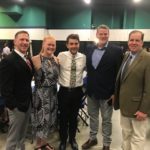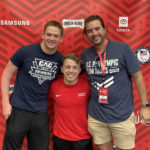It’s hard to believe now, but as a child, University of Mary Washington swim coach Justin Anderson ’10 had to be coaxed into the pool by his siblings. But it was all in good fun. Today, his family is so close that most of them live on the same block.
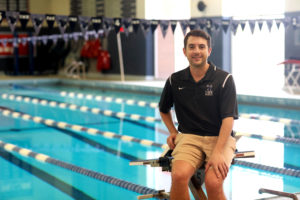
UMW Swim Coach Justin Anderson ’10 perched in front of Goolrick Pool. Photo by Karen Pearlman Photography.
He found a similar sense of belonging at UMW. “As a student, knowing I would be joining an incredible family in the swim team made it such an easy decision to come here.”
In college, he made a splash as an English major and star swimmer, breaking records and being named the UMW and Capital Athletic Conference scholar-athlete his senior year. Working with then-coach Matt Sellman made a tremendous impact on the course of his life, Anderson said. “He encouraged me to apply to NCAA coaching conventions, which really ignited my career.”
A few years after graduation, Anderson was hired at Frostburg State University in Maryland, which had just finished last in conference standings. “I spent that first year recruiting and teaching swimmers with no experience, just to fill our lanes,” said Anderson, who in four years, tripled his roster and coached the team to a conference third place.
There, he met Zach Shattuck, a swimmer with hypochondroplasia, or short-limbed dwarfism. “It was one of those moments that changed my life profoundly,” said Anderson, who plunged into the world of Paralympic swimming.
In 2018, he returned to UMW with Shattuck as assistant coach, where they began training Joey Peppersack ’21, who was born with a rare condition called tibial hemimelia, causing his leg to be amputated at age 4. The trio has traveled together and individually to top Paralympic meets in Singapore, England, Denmark, Australia and Peru, earning many medals along the way.
In August, they’ll add Japan to that list. Shattuck and Peppersack made Team USA, with Anderson serving as an assistant coach. “I’m excited to go to my first Paralympic Games with two of my swimmers,” he said, “and proud to see their years of hard work pay off.”
- From left to right: Anderson, Brian O’Donnell ’12 and Austin Clark ’12 about to begin the 100 freestyle at the conference championships in 2010, the last individual race of Anderson’s career.
- Anderson and his fellow seniors on the UMW Swim Team after their final conference championships in 2010. Clockwise: Matt DeMarr, Justin Anderson, Nina Michelle (Sawyer) Passmore, Amanda Kautz, Jason McCormack and Brandon Eads.
- Anderson and his UMW Men’s Swim teammates after earning the Capital Athletic Conference championship title in 2008.
- Anderson (center) with former UMW swim coaches Matt Kinney, Abby Brethauer, Matt Sellman, and Paul Richards, representing 35 years of UMW Swimming.
- From left to right: Joey Peppersack, Zach Shattuck and Justin Anderson at the U.S. Paralympic trials in Minneapolis.
Q: As a swim coach, how do use your English degree?
A: Communicating with recruits, alumni and parents; running social media accounts; and promoting our program within the campus community and to the outside world.
Q: What’s most rewarding about your job?
A: Helping UMW swimmers chase their goals both in and out of the pool.
Q: Most challenging?
A: Managing a team of 60 swimmers and staying attuned to all aspects of their student-athlete experience, especially during a pandemic.
Q: What might people be surprised to learn about you?
A: After I graduated from UMW, I spent six months hiking the Appalachian Trail from Maine to Georgia.
Q: What’s your favorite thing in your office?
A: Notes of encouragement written by my coaching mentors when I was hired at UMW.
Q: How have you kept busy during the pandemic?
A: Working on my dissertation for the Doctorate of Education program at Frostburg State University.
Q: What’s your motto?
A: My Grandma Flo always used to say, “Nothing lasts forever.” It helps me remember to cherish the good times and know that difficulty and hardships will eventually pass.
